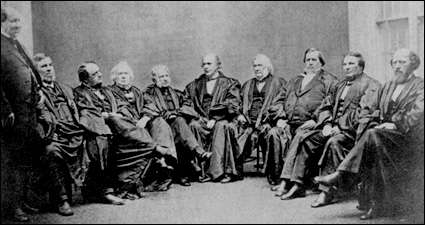The Volokh Conspiracy
Mostly law professors | Sometimes contrarian | Often libertarian | Always independent
Today in Supreme Court History: July 17, 1862
7/17/1862: Congress enacts the Confiscation Act, which empowers the government to seize the property of the rebels. The Supreme Court considered the constitutionality of that law in The Confiscation Cases (1873).

Editor's Note: We invite comments and request that they be civil and on-topic. We do not moderate or assume any responsibility for comments, which are owned by the readers who post them. Comments do not represent the views of Reason.com or Reason Foundation. We reserve the right to delete any comment for any reason at any time. Comments may only be edited within 5 minutes of posting. Report abuses.
Please to post comments


The Emancipation Proclamation sensibly receives a lot of attention.
Congress also played a significant role in using the South's slaves against them. For instance, this act prevented the military from taking part in the return of fugitive slaves:
"no person engaged in the military or naval service of the United States shall, under any pretence whatever, assume to decide on the validity of the claim of any person to the service or labor of any other person, or surrender up any such person to the claimant, on pain of being dismissed from the service."
A putative slave owner could only retrieve their slaves by taking an oath that they did not aid the rebellion. Even if they did, slaves who fled to military lines could not be given up by the military.
https://www.freedmen.umd.edu/conact2.htm
Governments may have lawful authority, but they do not possess inherent authority.